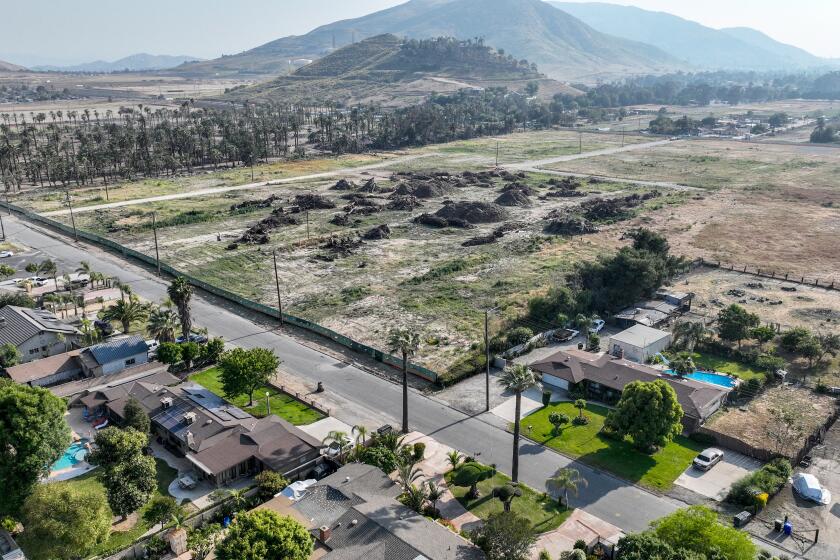Essential California Week in Review: $400 gas rebate? $200? Nothing at all?

Good morning, and welcome to the Essential California newsletter. It is Saturday, March 19.
Start your day right
Sign up for Essential California for news, features and recommendations from the L.A. Times and beyond in your inbox six days a week.
You may occasionally receive promotional content from the Los Angeles Times.
Here’s a look at the top stories of the last week
California lawmakers are tussling over who should get a rebate and how much. As the state, and the nation, grapples with a surge in gasoline costs, a group of California Democratic lawmakers has proposed sending a $400 rebate to every taxpayer in the state regardless of income or whether they own a gas-powered car. Republican lawmakers have pushed for a suspension of the gas tax, an approach they say would mean faster relief and fewer negotiations. On Friday, Democratic leadership delivered another proposal that would give Californians at least $200, increasing that amount based on their number of dependents. That plan would include households making up to $250,000 but would exclude Californians earning higher incomes.
UC Berkeley was rescued from a court-ordered enrollment freeze and steep admission cuts. Thanks to legislation signed Monday by Gov. Gavin Newsom, the university resumed plans to enroll more than 5,000 California first-year students. Litigation by a community group had threatened to cut the incoming class by a third. The group argued, in part, that the campus’ failure to build enough housing was sending too many students into neighborhood apartments, displacing low-income residents. Meanwhile, amid the state’s student housing crunch, UCLA become the first and only UC campus to guarantee housing for four years to first-year students.
A new bill could turn California into a haven for transgender youth. If they come to California, the minors would be protected from out-of-state court judgments seeking to remove them from their parents’ custody because the children have received surgeries, hormone therapy or other gender-affirming medical care.
This week in pandemic news:
- Los Angeles Unified School District officials announced Friday that the indoor masking requirement for students and staff would be lifted next Wednesday. In reaching a deal, the teachers union dropped its demand that mask mandates remain in place until a particular percentage of students and staff had been vaccinated against COVID-19. The deal also includes a commitment to keep in place required weekly coronavirus testing for all staff and students, which costs about $5 million per week, through the end of the school year.
- Rising coronavirus cases in Europe are a potential warning sign that another pandemic wave is possible this spring in California and the U.S., experts say. The rise has been attributed to Europe’s relaxed pandemic restrictions, waning immunity and higher transmission attributable to BA.2, a sublineage of the Omicron variant.
- Health and nutrition influencers have whipped up a frenzy about the COVID-19 vaccine and other public health guidance during the pandemic, steering people away from vaccination and toward health-related conspiracy theories.
- L.A. County began offering free anti-COVID pills at CVS stores to those newly infected with the virus.
California will end winter in a perilous position as record-shattering dryness converges with lagging water conservation efforts. Officials said that, after months of cutting back, Californians in nearly every part of the state increased urban water use in January. Now, increased restrictions and mandatory water cuts may be in the offing.
“I can’t breathe.” When Edward Bronstein’s family sued last year over his March 2020 death at a California Highway Patrol maintenance yard in Altadena, state attorneys revealed during discovery there was a video of his death. They argued it should not be made public. But a federal judge said the family had a right to the video. Disclosed Tuesday, it shows officers holding Bronstein down and forcibly drawing his blood as he repeatedly tells them he can’t breathe. The incident occurred two months before the murder of George Floyd.
Free online games
Get our free daily crossword puzzle, sudoku, word search and arcade games in our game center at latimes.com/games.
Newsom says Disney is welcome to void its relocation plans for 2,000 workers. As Florida lawmakers move to cement what’s become known as the “Don’t Say Gay” bill, the governor tweeted the House of Mouse that it could reconsider its plans to relocate jobs from Southern California to a new campus in the Sunshine State. Florida’s legislation would limit instruction on sexual orientation and gender identity in schools. Said Newsom: “Disney, the door is open to bring those jobs back to California — the state that actually represents the values of your workers.”
Fresno employees lost $600,000 in taxpayer funds in a phishing scam. The workers thought they were paying a contractor working on a new police station. Instead, they fell victim to wire fraud, which the city waited two years to disclose.
Kern County is pushing Newsom to allow an increase in oil production. President Biden’s ban on the importation of Russian oil — which is intended to undermine President Vladimir Putin’s ability to wage war in Ukraine — has contributed to soaring gasoline prices. It has also given oil industry advocates a new cudgel with which to fight California’s pumping restrictions.
L.A. County emptied out its troubled Central Juvenile Hall in downtown L.A. just days before state inspectors were to arrive. Two employees told The Times the move of about 140 children was hasty, disorganized and dangerous, and that some parents subsequently showed up for scheduled visits unaware that their children had been transferred elsewhere. A probation official said the rush to shutter the hall came after its staff began to review footage from the facility’s security cameras in advance of the inspection. The review revealed shortcomings: “They start looking at the videos, and they realize, ‘We’re screwed.’”
Get ready for the Festival of Books
Sign up for the Book Club newsletter for a guide to the events, authors and other highlights of The Times’ annual book festival, returning in-person April 23-24 to the USC campus.
ICYMI, here are this week’s great reads
The ex-Hollywood filmmaker bankrolling a far-right political revolt in rural California. Reverge Anselmo, the son of the billionaire who founded the network that became Univision, has funneled more than $550,000 into Shasta County elections since 2020, a record for a single person. Last year, he joined forces with far-right activists — including California secessionists and armed militia members — to support the Shasta recall election, donating money that could be spent on relentless television and radio advertising. The successful recall of a Republican supervisor, accused of not being conservative enough, stunned many Democrats and mainstream Republicans, who fear far-right activists are preparing to reorder Northern California and other rural parts of the state. Amid all the cheering and handwringing, few have focused on the fact that the Shasta County election had something few other campaigns can count on — a Connecticut-bred cowboy with a grudge and bottomless pockets to fund his political revenge.
Cal State has paid millions to executives after they resign. It’s called the Executive Transition Program, and it has paid out more than $4 million in salary and benefits to a small group of former executives. Those execs include former Chancellor Joseph I. Castro, who resigned last month amid outcry over accusations that he mishandled sexual abuse and workplace misconduct allegations when he was president of Fresno State. The deals included full medical, vacation and other benefits — and most of the execs have guaranteed lifetime faculty positions, entitling them to additional benefits. All this while undergraduate tuition increased by 5%, admission caps were placed on entire campuses, and students across the largest four-year public university system in the nation struggled under the financial burdens of the pandemic.
Today’s week-in-review newsletter was curated by Amy Hubbard. Please let us know what we can do to make this newsletter more useful to you. Send comments, complaints and ideas to essentialcalifornia@latimes.com.
Our daily news podcast
If you’re a fan of this newsletter, you’ll love our daily podcast “The Times,” hosted every weekday by columnist Gustavo Arellano, along with reporters from across our newsroom. Go beyond the headlines. Download and listen on our App, subscribe on Apple Podcasts and follow on Spotify.
Start your day right
Sign up for Essential California for news, features and recommendations from the L.A. Times and beyond in your inbox six days a week.
You may occasionally receive promotional content from the Los Angeles Times.




